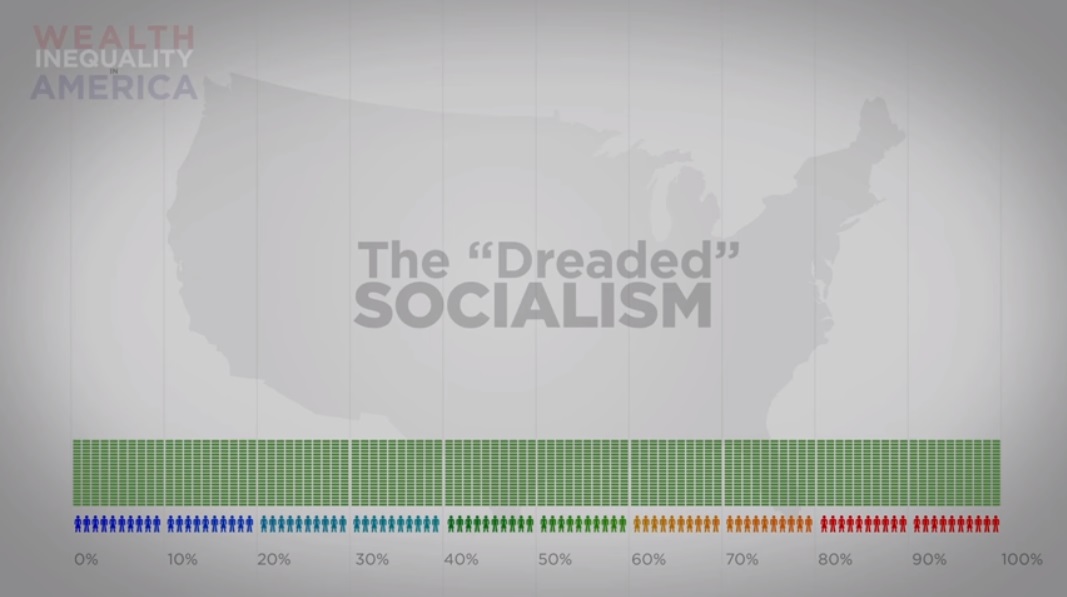Globalization does not merely mean cutthroat competition; it also means that the best minds from around the world can collaborate and, when necessary, correct one another’s conclusions. Scientists rely on this interplay of minds but so do other disciplines, not least economics, where clear thinking is perpetually in short supply.
A foreign free-market think tank has made a welcome critique of a viral video titled “Wealth Inequality in America,” which has racked up more than 20 million views on YouTube.
The video – recited by a man with a Southern drawl, perhaps to make its viewpoint more palatable outside the Ivy League – has three parts. It begins by reporting a survey asking Americans how much wealth they believe each sector of Americans should own in an ideal world. Next, it reports how much wealth Americans believe each group has. The fact that these two don’t match is cited as proof that “the system is already skewed unfairly” towards the wealthy. Finally, it reports actual wealth distribution in the United States.
The Fraser Institute, which is based in Canada, found the video so erroneous that it dedicated an entire appendix of its recent report on wealth inequality to the video. After deeming it “superficial and somewhat dishonest,” author Christopher Sarlo writes:
In several parts of the video there is confusion between wealth and incomee. … For example, there is a poverty line (which is income-based) right in the middle of a wealth chart. …
The fact that Sweden actually has almost the same level of wealth inequality as the United States did not stop the authors from concluding that “most Americans prefer Sweden”. …
Finally, the video contained not a whisper about the life-cycle effect. Were respondents made aware that even in a highly egalitarian society (where everyone has exactly the same lifetime wealth), there will be large differences in wealth at any point in time?
Most illuminating is the second footnote in that appendix, which deals with what people truly value:
Respondents were asked to pick between two outcomes and not two “processes”. A more equal wealth distribution might find more favour among respondents if it occurred naturally because everyone was equally able and made similar choices than if it occurred through aggressive redistribution and by prohibiting bequests and inter vivos transfers. And respondents’ answers might have changed if the more equal society had living standards and average wealth at the level of a third-world nation, like Cuba.)
A study published in April in Nature Human Behavior confirmed precisely this. Researchers found that respondents don’t care so much about how wealth is distributed as long as it is not accrued by cronyism, a situation that characterizes economically interventionist regimes (including our own). “People’s concerns about fairness lead them to favour unequal distributions,” the study’s authors write.
It is a testament to Sarlo and the Fraser Institute’s reports: Such is the quality of the data, logic, and presentation of the report that even the footnotes of its appendices are worth quoting. But they are worth quoting because they are rooted deeply in the reality of human nature.
Pope Leo XIII in his encyclical “On Socialism” (Quod Apostolici Muneris, 1878), wrote that a just society judges all citizens by equal, and morally sound, systems because of the genuine ground of human equality. “In accordance with the teachings of the Gospel, the equality of men consists in this: that all, having inherited the same nature, are called to the same most high dignity of the sons of God, and that, as one and the same end is set before all, each one is to be judged by the same law and will receive punishment or reward according to his deserts,” he wrote.
Wealth inequality stems from human diversity, which presents a kaleidoscopic reflection of God’s glory. While collectivists may “argue that … the property and privileges of the rich may be rightly invaded, the Church, with much greater wisdom and good sense, recognizes the inequality among men, who are born with different powers of body and mind – inequality in actual possession, also – and holds that the right of property and of ownership, which springs from nature itself, must not be touched and stands inviolate.”
The Acton Institute’s new undertaking, Religion & Liberty Transatlantic, intends to bring the best minds from across the transatlantic sphere to bear on our challenges, which we increasingly find we share in common. Together, we strive to enlighten the darkness that surrounds pressing issues, elevate the discourse, and promote a society that rewards the ennobling of the human race.
(Photo credit: Video screenshot.)
